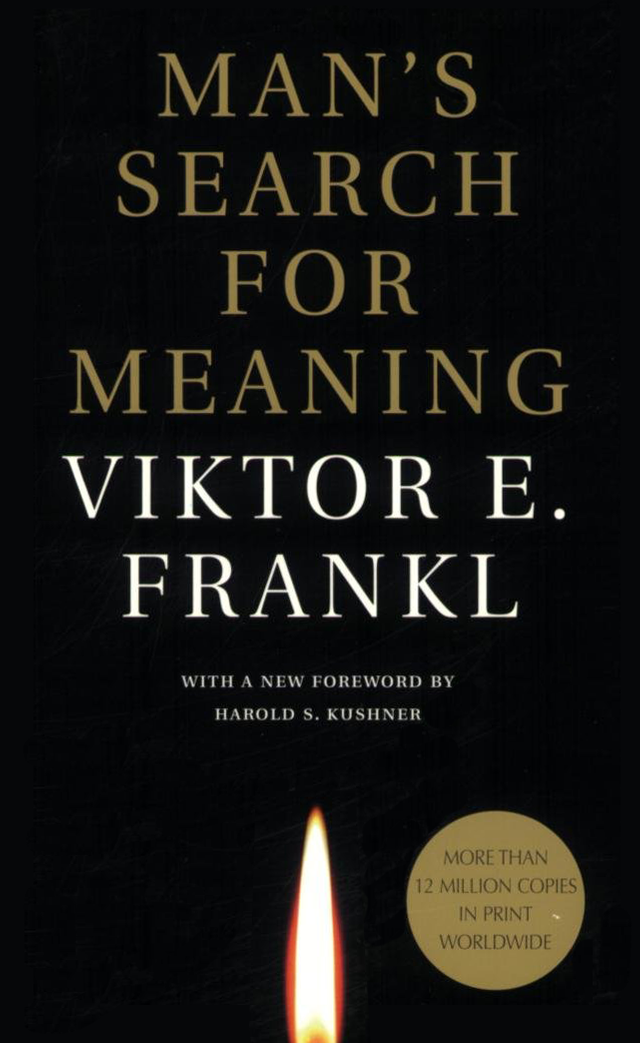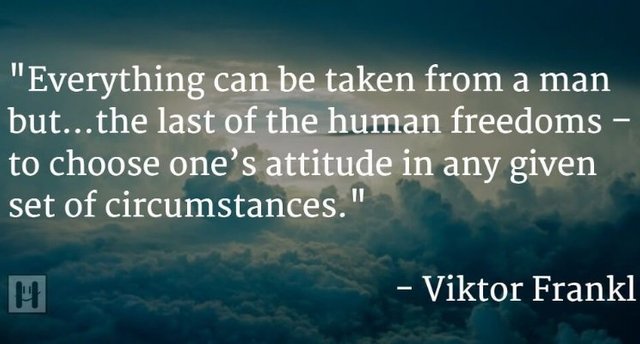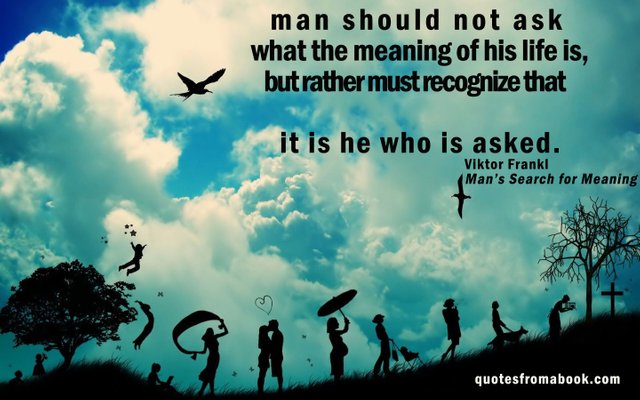TTW Must Read Books #1 - Man's Search for Meaning by Viktor Frankl
Hello Steemians!
I am going to change up the format of my blog a bit to write about some of my other interests as well as traveling, I will label them as part of a larger series and will continue with my travel posts as usual.
When I was traveling through South America I met a British guy named Nick who was in Colombia and had been teaching English for the last year in a small village about 5 hours from Medellin. We met at a hostel and we got to talking about our interests and he told me that another traveler had given him a USB drive with 10 books on it that everyone must read in their life. He hadn't read any of them yet but I asked if I could copy the data so I could take a look when I was finished with my current readings. Well, life happens and I forgot all about the books until a few days ago when I was cleaning out some old files on my laptop I stumbled back across them. As I read through the list I realized I had read a few of them so I chose the first one I hadn't read and that was:
Man's Search for Meaning by Viktor Frankl

I was immediately sucked into this book and finished it in just 2 days, it was a bit of a complex read at times but the subject matter was incredibly interesting. The author, Victor Frankl, was a psychiatry professor at the start of WWII and had the choice to travel from Austria to the USA before the war but chose to stay with his parents and as such was a survivor of 4 concentration camps by the time the war concluded. He split his book into 2 sections, the first being an account of the suffering that took place in the camps and the second being an introduction to his idea of meaning, Logotherapy.
When talking about the camps he avoids speaking too directly about his own experiences and leans toward giving an account of how the camps affected all the prisoners psychologically. This lays the groundwork for his truly ingenious theory and uses lots of examples to explain it thoroughly. Frankl talks about the three stages that every prisoner in the camps goes through when they enter:
- Shock - after having everything they own taken and given essentially rags to wear. This shock would last a few days as the reality of the situation starts to sink in.
- Indifference - only caring about what helps him survive and feeling no other real emotion. This is a state I have read about in other books where the people are so apathetic eventually they will give up their friends and family for survival.
- Depersonalization - if he is survives and is released he feels separated from himself. They are left with a feeling that it can't be true, they are not really free they are just waiting for the alarm to blow again and they return to the camp.
The Meaning of Life
Frankl argues that the meaning of life is not some all powerful answer that will transcend the lives of millions and change the world. But rather the meaning of life is found in every single moment of living and the meaning itself can and will change and feeling meaningful is all about your attitude.
"The unique opportunity lies in how you bear the burden..."
"Man is responsible and must actualize the potential meaning of his life."
-Viktor Frankl
Frankl also argues that no matter what you are going through, your attitude will dictate whether or not it is meaningless. While in the camp he described seeing men simply give up on life, they would refuse to get up in the morning and would just lay all day and night until they died. He also spoke of the increase in deaths after Christmas in one of the last years he was there and attributed it to the men dreaming of being home for Christmas and when that dream did not come true they simply gave up mentally and their bodies followed. When they lost something to hope for, or something to aspire to they simply had nothing left to live for and Frankl seemed to always keep the attitude that no matter how much is taken there is always something, and for him it seemed to be his love for his wife.

Frankl continues on to talk about the troubles that arise after the prisoners are released and feelings of depersonalization they have about their detention. He says that once they restored their bodies, their mental health was in question and needed to be guided to not be left with feelings of bitterness and disillusionment. The idea of coming home after all that time and finding that all your family was lost would be intensely difficult to overcome in my opinion but Frankl argue that it can and must be overcome to once again regain meaning in your life. Once this is overcome then he argues that the time spent suffering will seem like a nightmre that cannot be forgotten but that meaning can be restored to ones life and that life will continue on.
Logotherapy

The second part of the book introduces Logotherapy based on the groundwork laid out by the first section. Frankl argues that Logotherapy is activistic as opposed to pessimistic and is about the attitude which one takes toward their daily life. It is about reflecting with joy on the live that is lived and not having doubt in the opportunities missed and choices not made, essentially, that the past is something that cannot be changed so why not accept it and change your attitude to the future.
Live as if you are living already for the second time and as if you had acted the first time as wrongly as you are about to act now!
-Viktor Frankl
Logotherapy Techniques
Paradoxical Intention
The essence of Paradoxical Intention is quite self explanatory and I found that I had done this sort of this thing in the past without ever knowing it had a name and perhaps you have too. It is essentially replacing a fear with a paradoxical wish and thus reversing your attitude. The one requirement of this method is self detachment through a sense of humor, meaning you have to have some sense of humor for this method to be effective. Frankl gives the example of the sweating man. A man comes to visit him and says he cannot stop sweating in social situations and he gets more embarrassed the more he sweats and the cycle continues. Frankl suggests to make a paradoxical wish before entering the situations such as "I will show them how much I can sweat! I will fill 10 buckets!" and set your mind to achieve it, let go of the embarrassment and show them how much you can make. The result was that because the man had tried to focus on sweating there was no sweat at all, the nervousness and anxiety was replaced with the attempt to create sweat without social prompts. I am sure you have all experienced trying to sleep and not succeeding, well Frankl would argue that all you have to do is lay in bed and decide to stay awake all night and the result would be that you cannot and simply fall asleep. It is an interesting technique but perhaps it is a bit flawed in some executions.
Tragic Optimism
Tragic optimism is pretty self explanatory but is usually quite a bit more difficult in practice. To be able to stay optimistic can be difficult without a tragedy but in the face of the unthinkable it can feel downright impossible. Frankl says this is optimism in spite of the 'Tragic Triad' - Pain, Guilt and Death and he says that to achieve such optimism you need to change your attitude and approach the feelings in a different way:
- Turn suffering into human achievement.
- Deriving from guilt the opportunity to better yourself and be better.
- Deriving from life's transitoriness (the transient nature of life) an incentive to take responsible action
This follows everything that Frankl has argued and states that to overcome all the challenges in life you really do just need to change your attitude and see them in a new light.
Final Thoughts
Reading this book was a profound experience for me and it left me thinking about how to move forward in my life, both in body and mind, and I think that is feeling you get when you read a truly wonderful book. It makes you question things about yourself and leaves you wanting more and that is how I felt after reading Man's Search for Meaning. I don't know if everything in Frankl's theory is quite accurate but I am keen to try his methods out in my daily life and see how it plays out. There was one final quote that really resonated with me on a core level and I am still thinking about it the next day, it was the final quote in the book so I feel I should share it:
Since Auschwitz we know what man is capable of
And since Hiroshima we know what is at stake.
-Viktor Frankl
This truly is a wonderful book, it has been translated into 24 languages so if you get a chance find a copy in your language and give it a read, you won't regret it. Thanks for reading!

Interesting post
Thank you!
Hi, surely the book Man's Search for Meaning is interesting, I'll start reading it, since I could not find an interesting book book :), regards.
You definitely should! There are a few places online you can find it in ebook formats, thanks for reading!
There’s a quote I have taped to my monitor from this book, but I’m not home, and I sadly can’t remember it exactly. But it goes something like this: we all must choose what monument we want to leave behind as evidence of our existence. I’m not sure if he was referring to mankind in general, or to each individual. I take it as the latter. And I look at this quote when I’ve been spending too much time on some computer game rather than writing. 😃
Surely Frankel’s optimism is incredible considering what he had to go through. Funny enough, I just wrote a rather lengthy post about a different kind of optimism.
I would agree with you, I think he is talking about the individual with that quote. This book is honestly one of the most quoteable books I have ever read! I always take notes when reading this type of book and I filled about 10 pages with quotes and subtext. I am looking forward to reading more of his work because of his unique perspective. I will check out your post and follow you! Thanks for the comment!
Yes. The only thing about the book that concerns me slightly is if people read it and their takeaway is that meaning requires suffering. I don’t think that’s what he’s saying. He’s trying to show how to hold onto meaning despite suffering. But I wonder if some people confuse the horse for the cart.
Ya thats true it could be misconstrued, but I like how he says whatever is happening to you all you have to do is just own it and make it yours and it will never make your life meaningless. Regardless of suffering, I think he makes some great points that can be very useful for people suffering from depression or anxiety.
Awesome - I will need to read it!
I hope you get a chance!
Great review. I've been thinking about reading this book for a while and haven't got round to it yet as I have quite a long booklist. It really sounds like a must-read.
Thanks! Ya its actually not too long of a book, about 120 pages. The style of writing is a bit academic but I made it through it in 2 days and Im sure there are people that can do it faster. You should definitely check it out, the first section is amazing.
I certainly will!